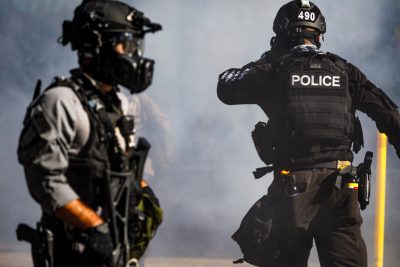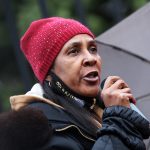Boston City Councilors Ricardo Arroyo and Andrea Campbell refiled an ordinance Wednesday seeking to restrict the Boston Police Department’s use of chemical weapons and less-lethal projectiles against protestors.

The proposed restriction would mandate that Boston police use chemical weapons — teargas and pepper spray — and kinetic impact projectiles — beanbags and rubber bullets — only if a supervising officer witnesses violence or destruction of property and determines the situation cannot be controlled or de-escalated otherwise.
After a supervisor determines that such force is warranted, they would be required to warn the crowd at least two times, two minutes apart, and ensure that an exit is available.
The council passed a previous draft of the ordinance in December, following months of public and official testimony. That draft was rejected by Mayor Marty Walsh on New Year’s Eve, who wrote that it infringed upon the police commissioner’s authority.
Speaking at Wednesday’s meeting, Arroyo noted that the proposal was not a complete ban.
“Frankly, when we’re talking about the use of projectiles and ordinance that have caused death, that can cause serious injury,” he said, “we should have a framework and some method of doing this to ensure the most safety that we can for our civilians and our residents.”
Current BPD regulations mandate that less-lethal projectiles be fired only at the discretion of specially trained SWAT Team members. There is not currently a mandated warning period for projectiles or chemical weapons.
The Boston Police Department did not provide comment on the ordinance after multiple requests.
At the meeting, Campbell, a mayoral candidate, said she was looking forward to “getting it done again” and appreciated the advocacy work of residents.
“We had a lot of folks who stepped up to email and to call about their personal experiences with these weapons,” Campbell said. “It really at moments was quite painful to listen to some of these stories.”
A spokesperson for Campbell’s campaign added that the Councilor believes the use of teargas on protestors should be fully banned.
Chemical crowd control agents such as teargas immediately irritate the eyes, skin and respiratory tract, said Robert McCunney, a physician in the pulmonary division of Brigham and Women’s Hospital.
He added that the long-term impacts of exposure to teargas are difficult to study due to a limited supply of studies and potential ethical concerns over clinical testing — especially among individuals with pre-existing conditions.
“Most of the health-related information on implications of teargas are based on case reports and also controlled human studies, often with volunteers,” McCunney said. “It’s unusual to have studies of people who may be considered more vulnerable, as it were, such as people with asthma, COPD and other conditions.”
McCunney added that, while uncommon, chronic effects are most often pulmonary and most likely to take shape in individuals with prior health concerns.
The ordinance notes that chemical crowd control agents are “indiscriminate weapons by design,” which makes exposure difficult to limit and increases the risk of bystanders being caught in the clouds.
The rejected draft included a provision that officers who fail to notify protestors before firing rubber bullets or teargas would be suspended for at least five days and possibly discharged. That section was cut from the refile.
Following Wednesday’s meeting, the redrafted ordinance was sent to the council’s Committee on Government Operations — chaired by Councilor Lydia Edwards, who voted in its favor last year and voiced her support Wednesday, saying it was “unnecessarily controversial.”
“At the end of the day, no one is taking away so much as, please, asking for our police to have an understanding of how they use these [weapons],” she said.
If the ordinance passes again, it will be sent to the Mayor’s Office a second time, although it is uncertain whether that will take place before Walsh is confirmed as U.S. Labor Secretary and City Council President Kim Janey becomes the city’s acting mayor.
Janey, who was not present when the ordinance was refiled, voted to pass the original draft last year.




